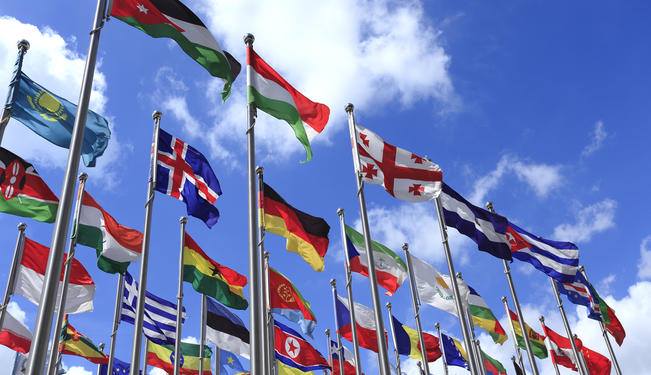
I wrote an article in September criticizing the Trump administration’s dismissal of the International Criminal Court. I considered the U.S. action to be a lack of respect for justice and the rule of law.
Last week, the Trump administration took two more scandalous actions further flouting international law and avoiding the peaceful option of legal recourse to conflict resolution.
Secretary of State Mike Pompeo announced that the United States was terminating the Treaty of Amity signed in 1955 between the U.S. and Iran, after a unanimous ruling on October 3, 2018, by the International Court of Justice (ICJ), also known as the World Court, that the United States had to resume the export of humanitarian goods and spare parts for civil aviation safety services to Iran, despite U.S. sanctions. This was certainly a victory for Iran, as it had sued the United States in the World Court. The U.S. withdrawal from the treaty made it look like a sore loser.
President Trump renewed the U.S. sanctions after withdrawing this May from the 2015 nuclear deal with Iran and several other major powers. The sanctions covered dollar transactions, food exports and sales of aluminum and steel. In November, the U.S. will add new sanctions against Iran’s oil sales, energy and shipping sectors and foreign financial transactions.
After the verdict, ICJ President Abdulqawi Yusuf announced that “the court’s order applies to medicines and medical devices; foodstuffs and agricultural commodities; and spare parts, equipment and repair services for civil aviation. The United States must also ensure that licenses and authorizations are granted and that payment for such goods and services are not subject to any restrictions,” the Washington Post reported.
Although the rulings of the International Court of Justice are binding, they are not enforceable. U.S. National Security Adviser John Bolton, during his appearance at the White House press briefing on Oct. 3, stated that Iran had “made a mockery” of the Amity Treaty. In response, Iran’s Foreign Minister Mohammad Javad Zarif called the United States “an outlaw regime.”
The United States hasn’t always had a track record of disavowing the ICJ; but their relationship with it is opportunistic and defined primarily by the U.S.’s skewed sense of fairness. For example, back in 1979, the United States sued the government of Iran after the takeover of the U.S. Embassy in Tehran by Iranian militants. The U.S. won that case and the ICJ ordered Iran to release all American hostages and pay compensation. What a coincidence that the United States government wasn’t interested in cancelling its treaty with Iran in 1979 during the hostage crisis.
The Washington Post reported that “during meetings at the United Nations last week, Trump, Pompeo and Bolton railed against Iran and berated various other member states and U.N. bodies for not bending to American interests. Their approach elicited an icy reaction. At a Security Council session chaired by President Trump, every other member of the U.N.’s most powerful body scolded Washington for its rejection of the nuclear deal, an agreement the council had endorsed.”
On Oct. 3, 2018, Bolton also announced that the United States would withdraw from the “optional protocol” under the Vienna Convention of Diplomatic Relations. This decision was prompted by the filing of an ICJ complaint in September 2018 by the Palestinian Authority against the United States for moving the U.S. Embassy in Israel from Tel Aviv to Jerusalem.
The Vienna Convention is an international treaty which sets out diplomatic relations between states and provides immunity to diplomats. Ironically, Bolton stated: “the United States remains a party to the underlying Vienna Convention on Diplomatic Relations and we expect all other parties to abide by their international obligations under the convention.”
Bolton further announced that the United States will review all other international agreements to safeguard U.S. sovereignty. In less than two years of Trump’s presidency, the United States has withdrawn from the nuclear agreement with Iran, the global climate agreement, the United Nations Educational, Scientific and Cultural Organization, threatened to distance itself from NATO, left the UN Human Rights Council, and cut off funding to UNRWA (United Nations Relief and Works Agency) which has been providing humanitarian aid to millions of Palestinian refugees for the past 70 years.
Constitutional lawyers may question the legal right of the Trump administration to abrogate international treaties which are ratified by the U.S. Senate. Shouldn’t the Senate give its consent to the White House before it withdraws from such treaties? In the first 189 years of America’s history, 40 treaties were abrogated after both houses of Congress agreed to do so. Just two treaties were abrogated by the Senate only, after a vote by two-thirds of its members. Unfortunately, in recent years, due to congressional ineptitude and historical inactivity, the Executive Branch has taken the initiative of unilaterally abrogating international treaties. This is an issue that U.S. Congress should review, particularly if Democrats win the majority, in order to restrain Pres. Trump’s arbitrary decision-making, which is embarrassing to the United States on a global scale.
Hopefully, a more responsible U.S. President in the future will reverse Trump’s deeply flawed decisions on international agreements and other vital issues.


Trump has also been withdrawing from bad trade agreements made during previous administrations in an effort to balance the playing field because we are being taken advantage of by other countries. When he backs out of anything rest assured he will come back and make a better deal. He has been negotiating with countries and businesses all his life. He knows what he is doing. We are lucky a 70 year old multi-billionaire who could live the rest of his life anywhere he pleased was willing to do this and has been extremely successful despite all that the left has thrown at him. We should be thankful because he is a true patriot..
Right on Mal. President Trump is looking out for us, The united States of America. It’s about time we have someone putting U.s. first. #MAGA